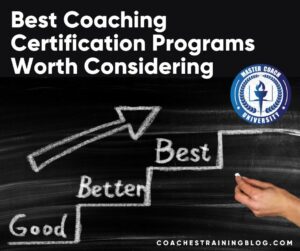
In the previous two blogs, we shared information on the new Code of Ethics, how it came about, the beginning sections in the Code of Ethics, and then a review of the standards themselves.
In this blog, the focus is on the pledge, what happens in terms of ICF holding us accountable to the Code of Ethics, and definitions that are in the appendix of the new Code of Ethics.
With the standards, it says, “I understand that ICF may, at its discretion and according to the ECR process, hold me accountable for violations of the ICF Code of Ethics. I further agree that my accountability to ICF may include sanctions for any violation, such as mandatory additional coach education, mentoring, supervision, or loss of my ICF membership and/ or ICF credentials.”
This is followed by the next section with the pledge.
- THE PLEDGE OF ETHICS:
While fulfilling any role within the ICF ecosystem, I promise to uphold my ethical obligations by adhering to the ICF Code of Ethics in all my professional interactions. I commit to doing my best to represent the integrity and professional reputation of coaching and the ICF.
Very specifically, ICF has an internal review board, and there is a process on their website so that if somebody has a complaint against a coach or a member of ICF, they can file that complaint, and the internal review board will check to see if they have jurisdiction. Is the coach being complained about actually a member or credential holder from ICF? Because that’s where they have jurisdiction. They look at the complaint itself. Is it something that they appropriately address because it is encompassed within the Code of Ethics? They are determining if it is appropriate for them to investigate.
When those determinations indicate yes, they do an investigation. They have conversations with the people who filed the complaint, anyone else involved, and with the coach. They decide whether there has been a breach and if there has been, they decide on the consequences. They prefer education over removing membership or a credential.
What’s important to all coaches is being aware of what comes up in those complaints so that we can evaluate ourselves and what we’re doing and ensure, am I continuing to learn and develop ethical maturity? Am I staying on track with the Code of Ethics? One of the most common sources behind complaints is a lack of clear agreement when you start the coaching engagement.
Having a checklist when you go into the agreement phase with the client, and having a formal agreement, whether it’s written or verbal, sets up that coaching relationship. When the agreement is clear, everybody knows what to expect.
The definitions have been expanded. So, there’s lots of them to explore. Key words used in the Code of Ethics are in alphabetical order in the definitions, and other important terms are in the glossary, also in alphabetical order.
Artificial intelligence is defined as any algorithm or machine-based technology that enables computers and other digital devices to simulate human intelligence and problem-solving skills. There’s a lot happening with AI in the coaching world.
Client is defined as the individual, team, or group member being coached, the coach being coached, mentored, or supervised, or the coach in training.
The definition for coaching has an addition to it. It now says “partnering with the clients in a thought-provoking and creative process that inspires them to recognize and maximize their personal and professional potential.” The addition to this definition is the words “to recognize”.
Coaching agreement is defined as a formal document established between an ICF professional and the clients or sponsors that outline the terms, expectations, and conditions of their coaching relationship. It typically includes details such as the goals of the coaching, the duration and frequency of sessions, confidentiality policies, payment terms, cancellation policies, and the responsibilities of both the coach and the client.
Coaching engagement is defined as the structured interaction between an ICF professional and the client or sponsors. This engagement encompasses the entire coaching process, including the initial assessment, goal setting, regular coaching sessions, progress tracking, and evaluation of outcomes.
The coaching relationship is defined as a relationship that is established by the ICF professional and the client or sponsor under an agreement that defines the responsibilities and expectations of each party.
Coach supervisor is a term that is newer to many people, and it’s incredibly valuable. A coach supervisor is an experienced coach who engages in reflective dialogue and a collaborative process with a coach or group of coaches for personal, professional, and ethical development and learning.
Code is the ICF code of ethics, the document that we’re talking about. It includes the purpose, core values and ethical principles, commitment, standards, key definitions, glossary, and pledge.
Confidentiality is defined as the protection of any information obtained in or around the coaching relationship unless there’s a legal reason or requirement, a threat of harm, or written consent to release as given by the client.
Conflict of interest is a situation in which an ICF professional is involved in multiple interests where serving one interest could work against or conflict with another. This could be financial, personal, intrinsic, professional, or a perceived conflict with a client, prospective client, or sponsor.
Core competencies are the specific skills of professional coaches.
Equality is defined as a situation in which all people experience inclusion and access to resources and opportunity regardless of their race, ethnicity, national origin, color, gender, sexual orientation, gender identity, age, religion, immigration status, mental or physical disability, and other areas of human difference.
ICF accredited coaching education is a program offered by an educational institution that has gone through a rigorous review process by the ICF and demonstrates that its curriculum aligns with the ICF definition of coaching, ICF core competencies, and the ICF code of ethics.
Yes, the programs at the Center for Coaching Certification are ICF accredited coaching education.
An ICF credential is a professional certification indicating a person has met specific standards and requirements designed to develop and refine their coaching skills. ICF credential designations include the ACC, the PCC, and the MCC.
These are different than coaching certifications a school issues because earning a credential requires the training and also it requires experience coaching, it requires mentor coaching, it requires being assessed on your coaching, and it requires an exam. So, the ICF credential is issued only by ICF, whereas a coaching certification is issued by the school.
ICF ecosystem is defined as the six family organizations that include ICF Professional Coaches, ICF Credentials and Standards, ICF Coaching Education, ICF Foundation, ICF Coaching in Organizations, and the ICF Thought Leadership Institute. All of these are under the umbrella of the ICF global board of directors.
An ICF professional is defined as individuals who represent themselves as an ICF member and / or credential holder in roles including but not limited to coach, coach supervisor, mentor coach, coach trainer, coach in training, board member, volunteer, or leader.
ICF staff is any person who is employed or contracted by ICF or any management company contracted by ICF to provide management and administrative services.
Intellectual property is defined as creations of the mind that are legally recognized as the property of their creator or owner. Intellectual property rights grant the creator or owner exclusive rights to use, produce, and distribute their creations which are protected under laws against unauthorized use or infringement.
Legal is defined as compliance with the laws of the country where the coach practices.
A mentor coach is an experienced coach who provides a collaborative learning process through which feedback is provided to another coach based on observed or recorded coaching sessions to further develop their unique coaching style and skills in alignment with the ICF core competencies.
Sponsor is the entity including its representatives or individual paying for and or arranging or defining the coaching services to be provided. This includes those having parental responsibility for minors.
Support personnel is the people who work for ICF professionals and who have access to information about clients and or coaches that can include administrative assistance, marketing, accounting, etc.
Systemic equality is gender equality, race equality, and other forms of equality that are institutionalized in the norms, language, images, beliefs, ethics, core values, policies, structures, laws, practices, and cultures of communities, organizations, professional associations, nations, and society.
Systemic oppression is systemic racism, colorism, sexism, and other forms of systemic equality that are embedded in the norms, beliefs, values, languages, images, ethics, core values, policies, structures, laws, practices, and cultures of communities, organizations, professional associations, nations, and society that perpetuate widespread prejudicial and harmful treatment of people with marginalized identity and reward and benefit people with privileged identity.
Next is the glossary of terms. These are words that are not in the code of ethics and are significant to understanding coaching.
A coaching platform is defined as using digital technology to enable an integrated and seamless coaching journey between coaches and clients at a large scale.
A coaching platform provider is an organization utilizing a coaching platform developed on their own or by a platform developer and branded as their own coaching technology platform.
A coaching provider is a for-profit or non-profit organization providing professional coaching services including but not limited to a corporation, limited liability company, non-profit, or partnership. Coach 123 is an example of a coaching provider.
Coaching supervision is a dynamic and reflective process of collaboration, guidance, and support through which coaches develop their personal, professional, and ethical capacity and maturity.
DEIB. This includes diversity, equity, inclusion, and belonging. The combination of key concepts that support a range of similarities and differences, fair access and treatment, being welcoming, feeling a part of a group, and fairness. Diversity is further defined as race, color, caste, ethnicity, gender identity, sexual orientation, rank, socioeconomic status, age, spiritual practice, national origin, ability, and other groups, classes, and categories of human differences such as personality characteristics, appearance, communication styles, and leadership styles. Equity is further defined as actions that provide access to resources and opportunities and establish norms, actions, policies, infrastructure, and culture so that everyone can realize their full potential. Inclusion is action that includes and fully supports people from marginalized as well as privileged groups by creating and maintaining processes, infrastructure, and culture so their inclusion goes beyond assimilation and differentiation to integrating them in the life and work of the organization in a way that they participate in decision making about what the organization’s work is and how the work gets done. Belonging is a sustained sense of connectedness and involvement with the organization and its work by marginalized and privileged members of an organization based on their experience that their presence, contributions, and inherent worth are truly valued and affirmed as demonstrated by the ongoing actions of the organization.
An external coach is a coach hired from outside of an organization who is neither a part-time nor full-time employee of an organization to coach employees of the organization.
Group coaching is coaching a group of individuals who have similar goals or interests serving each to move forward in their progress where the coach and other group members offer support and inspiration on individual abilities and potential.
An ICF assessor is a credential coach that has successfully completed ICF assessor training. ICF assessors review and assess the recorded coaching sessions for ACC, PCC, or MCC candidates.
An important one: ICF certified. This is a term that gets thrown around a lot and is misunderstood. The definition indicates ICF credential and applies only to those with an ICF credential, the APC, PCC, or MCC, and that is given by ICF. What does that mean to us? That means when somebody completes training, they’re not ICF certified. They have a coaching certification from the school that’s accredited by ICF. They themselves are not ICF certified until they earn a credential. It’s important to be clear on that so as to accurately identify your experience and qualifications.
An internal coach is an individual who is employed within an organization and coaches either part-time or full-time the employees of that organization.
Team coaching is partnering in a co-creative and reflective process with the team and its dynamics and relationships in a way that inspires them to maximize their abilities and potential in order to reach their common purpose and shared goals.
Visit www.Coach-123 or at www.CoachCert.com



